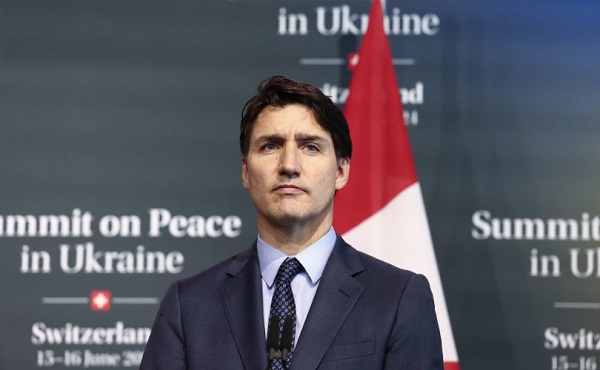By Anthony Murdoch
Democracy Watch asked that an independent prosecutor be appointed to look over evidence it provided to get permission to carry out a private prosecution of Trudeau’s role in the SNC-Lavalin affair.
One of Canada’s most well-respected democratic watchdog groups says the Ontario government should organize for an impartial prosecutor to investigate former Prime Minister Justin Trudeau’s involvement in the SNC-Lavalin affair.
In a letter dated March 21 written to Ontario’s Attorney General Doug Downey, watchdog Democracy Watch asked directly that an independent prosecutor be appointed to look over evidence from its recent Ontario Court of Justice application to get approval to go ahead with a private prosecution of Trudeau’s role in the 2019 scandal.
“The RCMP (Royal Canadian Mounted Police) did a very superficial investigation into the Trudeau Cabinet’s obstruction of the prosecution of SNC-Lavalin,” wrote lawyer Duff Conacher, co-founder of Democracy Watch, on behalf of the group’s board of directors.
Conacher noted that the RCMP “didn’t even interview many witnesses or try to obtain key secret Cabinet communication records, and buried the investigation with an almost two-year delay, and then made a behind-closed-doors, very questionable decision not to prosecute anyone.”
SNC-Lavalin, which now goes by the name “AtkinsRéalis,” in 2019 pleaded guilty to fraud in a Québec Provincial Court and was hit with a $280 million fine. Company executives also admitted that they had paid $47.7 million in bribes to get contracts in Libya.
In October 2023, Canadian Liberal MPs on the ethics committee voted to stop the RCMP from testifying about the SNC-Lavalin bribery scandal.
In June 2023, LifeSiteNews reported that the RCMP denied it was looking into whether Trudeau and his cabinet committed obstruction of justice concerning the SNC-Lavalin bribery scandal.
In its letter, Democracy Watch called up Downey to strike a committee comprised of persons without political party ties to choose an impartial lawyer to be an Independent Special Prosecutor. This prosecutor would review all the evidence and then make a public decision about Trudeau’s involvement in the affair.
“The RCMP lacks independence from the Prime Minister and Cabinet ministers who handpick the RCMP Commissioner and deputy commissioners and division heads through a secretive process, and they all serve at the pleasure of the Cabinet so they are vulnerable to political interference, which is likely part of the reason the RCMP rolled over and let Trudeau off,” noted Conacher.
“The Attorney General is also a tainted by partisanship as he is from Ontario’s ruling party and so, to ensure integrity and impartiality, a fully independent special prosecutor needs to be appointed to review the evidence concerning whether the prosecution of Trudeau should proceed.”
Conacher also stated that a public inquiry was needed to see why the RCMP “tried to cover up its investigation” and chose not to prosecute.
Retired judge also says Trudeau should be prosecuted
SNC-Lavalin was faced with charges of corruption and fraud concerning about $48 million in payments made to Libyan government officials between 2001 and 2011. The company had hoped to be spared a trial and have its prosecution deferred.
However, in 2019, then-Attorney General Jody Wilson-Raybould did not go along with the request and contended that both Trudeau and his top Liberal officials had inappropriately applied pressure on her for four months to directly intervene in the criminal prosecution of the group.
Jen Danch of Swadron Associates law firm will be representing Democracy Watch for its application, with Wayne Crookes, founder of Integrity B.C., being a key supporter of it.
Of interesting note is that the application includes an opinion from an unnamed retired superior court justice who also supports the prosecution effort.
“There are reasonable and probable grounds to believe that the Prime Minister committed the offence of Obstruction of Justice under s. 139(2) of the Criminal Code and possibly the offence of Breach of Trust by a Public Official under s. 122 of the Criminal Code,” wrote the judge.
“The facts outlined by the Ethics Commissioner and the evidence of Ms. Wilson-Raybould at the House Committee on Justice indicate that the Prime Minister and his staff set out to interfere in the prosecution of SNC-Lavalin by trying to stop the prosecution and replace an apparently properly founded prosecution with a less onerous process that would avoid the consequences of a conviction for SNC-Lavalin.”
At this time, there will be a hearing in Ottawa on March 28 where a judge will decide procedural processes regarding how or if the prosecution will be allowed to continue.
Last year, the RCMP confirmed it never talked with Trudeau or was able to view secret cabinet records before declining to levy charges.
As for the initial investigation concerning SNC-Lavalin, Wilson-Raybould testified in early 2019 to Canada’s justice committee that she believed she was moved from her justice cabinet posting to veterans’ affairs due to the fact she did not grant a request from SNC-Lavalin for a deferred prosecution agreement rather than a criminal trial.
Of note is that a criminal conviction would have banned the company from landing any government contracts for 10 years.
Trudeau flat-out denied it was being investigated by the RCMP.
Less than four years ago, Trudeau was found to have broken the federal ethics laws, or Section 9 of the Conflict of Interest Act, for his role in pressuring Wilson-Raybould.
Related















